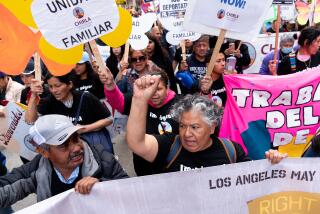Editorial: In a world full of persecution, how many people can the U.S. protect?
There is no question that Aminta Cifuentes’ marriage was not just bad but a threat to her life. Her husband beat her regularly. He burned her breast with caustic paint thinner. He raped her. When police were called, the officers refused to intervene; then, he threatened to kill her if she called them again. After Cifuentes ran away with her two children, the husband tracked her down and the violence resumed.
It was, as a court ruling said, “repugnant abuse.” But it took place in Guatemala. In 2005, Cifuentes sought asylum in the U.S. Her argument: that in Guatemala’s male-dominated culture, where many husbands view their spouses as property and police routinely ignore requests for help, battered wives form a defined social group subject to persecution and thus have standing to seek asylum under U.S. immigration rules.
In a recent but little-noted decision, the nation’s top immigration court agreed. It was a good decision for the battered wives of Guatemala, but the precedent-setting ruling raises difficult questions about the ability and responsibility of the U.S. to protect the persecuted in a world full of persecution.
The impulse to give battered women shelter is admirable, and the ruling by the Board of Immigration Appeals is binding on the nation’s immigration courts. In fact, it formalizes a stipulation by the Department of Homeland Security that Cifuentes had established she was persecuted because she was part of a group composed of “married women in Guatemala who are unable to leave their relationship.” This is the kind of protection that immigrant rights advocates expect from U.S. asylum laws.
Still, the United States can’t protect everyone who needs protection. One way the law determines who is eligible for asylum is by deciding whether the applicant belongs to a “particular social group” of persecuted people. But it is not an entirely persuasive argument that battered Guatemalan wives form such a group. They are linked not through innate, unchangeable characteristics but because they married abusive men. The group is defined from the outside, by the actions of others, and not by an immutable quality inherent in its members.
While the new special class is limited to abused Guatemalan wives, Guatemala is hardly the only country in which women have limited protection from their spouses. Cifuentes’ legal argument could reasonably be applied to women living in other male-dominated cultures. In fact, individual asylum appeals have been granted in recent years to women escaping domestic violence not only in Guatemala but in Mexico, Honduras, El Salvador and elsewhere.
Making room for people in trouble is part of the American tradition, even if it has been unevenly embraced over the years. The underlying concept is that of “non-refoulement,” a principle of international law that it is wrong to force people to return to a place where they face persecution or abuse.
Since 1980, the U.S. has granted admission to about 1.8 million refugees and asylum-seekers. (As defined by the government, asylum-seekers are those who request sanctuary from inside the U.S. or at the border; refugees apply from abroad.)
While it’s good that the recent ruling gives battered Guatemalan women cause for hope, the potential scope of its impact raises significant questions about whether the U.S. should make itself a safe harbor for domestic abuse victims everywhere. Despite the obvious humanitarian issues, we’re concerned about establishing such a broad policy judicially or bureaucratically, rather than through congressional action.
When it crafted the Refugee Act of 1980, Congress left it up to the executive branch to define who might qualify for asylum. The attorney general developed the criteria.
This is a political issue as much as a legal or humanitarian one. If the legal argument in the Cifuentes case can be applied to other cultures in which spousal abuse is endemic and women receive no protection, it might be time for Congress to more specifically define what exactly a special social group is. The US. needs to be flexible enough to accommodate unforeseeable categories of abuse without creating an influx that the immigration system can’t handle.
Those are decisions better made by Congress as part of immigration reform than by the attorney general, or by immigration courts trying to divine congressional intent.
Follow the Opinion section on Twitter: @latimesopinion
More to Read
A cure for the common opinion
Get thought-provoking perspectives with our weekly newsletter.
You may occasionally receive promotional content from the Los Angeles Times.






